- Home
- S. Hussain Zaidi
Dawood's Mentor Page 2
Dawood's Mentor Read online
Page 2
The closed-circuit cameras of Hotel Pegasus had captured images of suspicious men, widely alleged to be Chadha and an accomplice, hastily exiting Woolmer’s room after a heated exchange with the coach. Hours after the reported altercation on 18 March 2007, Woolmer’s body was found in his room, strangled.
The murder caused a huge uproar because, just the day before, the Pakistani team had been disgracefully defeated by the Irish, who were then international-cricket greenhorns. Investigators alleged that both Chadha and Anis Ibrahim, Dawood’s younger brother, were spotted in Jamaica. Later, Chadha’s name, along with Dawood’s, also cropped up in other cricket-betting scandals, including the Indian Premier League. Cricket bookie Mukesh Kochhar and his links with Dawood were widely investigated.
Beyond doubt, it is a known fact that Dawood respects Chadha far too much and addresses him as Bade Bhaiyya (‘elder brother’)—an agnomen that Dawood has never used for anyone since the gruesome killing of his brother Sabir in February 1981.
It was this Bade Bhaiyya of Dawood’s who came to the rescue of film-maker Sanjay Gupta when his film Shootout at Wadala had touched a raw nerve in Dawood Ibrahim. Gupta had become a marked man for the D-Gang.
Sanjay Gupta’s story is not unlike the quintessential Bollywood success story. He began by assisting film-maker Pankaj Parashar while still in his teens, and had already tasted success by the age of twenty-four. Gupta had shot to fame with his debut directorial venture, Aatish: Feel the Fire, starring Sanjay Dutt and Raveena Tandon.
While enjoying many successes over the years with his direction, Gupta next turned to make a sequel to 2007’s Shootout at Lokhandwala, titled, Shootout at Wadala, the story of the first official police encounter involving gangster Manya Surve. This was momentous for Gupta for many reasons. Before Shootout at Wadala, he had suffered a series of misfortunes, both personal and professional. Sanjay Dutt’s frequent incarceration had put a spanner in the works and he had been forced to abandon plans of casting Dutt in any of his films. And then one fine day, their friendship could not withstand the pulls and pressures of the industry. Gupta’s marriage also went kaput and the divorce was his personal hell for six years.
When Shootout at Wadala happened, things were looking up for him. He had managed to woo his wife back and married her again on the same wedding date he had married her earlier. They had a baby boy and Ekta Kapoor had promised to produce Shootout at Wadala. He felt happy with his life again.
Shootout at Wadala was supposed to be grander than its earlier edition. Ekta Kapoor had big plans for promoting the movie. Gupta called me for help with developing the story of the encounter for authentic details. I had already researched on Manya Surve for my book Dongri to Dubai, and we began to collaborate. We had long chats during the making of the movie. Gupta wanted to make an epic mafia movie and carve a niche in Bollywood for himself as the best film-maker on mafia and crime.
Gupta signed Sonu Sood and Manoj Bajpai to portray the roles of Dawood Ibrahim and Sabir Ibrahim. He had planned to use the real names behind the mafia characters in the film. Earlier, Anurag Kashyap had done this while adapting my book Black Friday to celluloid. His movie had received critical acclaim.
All hell, however, broke loose when Dawood and Sabir introduced themselves in the first trailer of the movie released on YouTube on 1 May 2013. Sabir was shown mercilessly butchered by his enemies, a replay of the real-life events that led to his killing.
At that point of time, the movie was almost complete, ready to be released in a few weeks. The promotions and press events were at their peak. Any movie based on a book piqued the interest of the readers. I had been lucky to have two massive book releases earlier, Black Friday, which was already a movie, and Mafia Queens of Mumbai. Vishal Bhardwaj had announced his plans to make a movie on one of the stories in the latter during its book launch. For me, the conversion of part of my third book on celluloid for the third consecutive time was a dream coming true.
My wife, Velly Thevar, was ecstatic at my personal success. She is much more talented, more creative, can write better than me and is one of the bravest women journalists I have met. Yet, at the time, she took a back seat and happily promoted my career. A vegetarian to the core, Velly threw a party for me. After years of dosas, idlis, avial and appams, she rustled up some delicious rotisserie chicken. After the dinner we both decided to conclude our celebration and call it a day.
Fifteen minutes after midnight, I received a call on my phone. The display window exhibited a Dubai number. I answered the phone and immediately recognized the voice. It was Chhota Shakeel, Dawood’s man Friday. We had spoken to each other several times since I was a budding crime reporter in the Indian Express in the 1990s. Shakeel was livid at the apparent misrepresentation and wrong portrayal of the ‘company’ in the movie. He wanted the movie to be shelved. I tried to reason with him that a solution could be found for the problem. But Shakeel was furious and not willing to be hear any explanations—our conversation ended with Shakeel slamming the phone down after threatening the film’s director, Sanjay Gupta, with dire consequences.
I was concerned about Gupta’s safety. I knew his personal trajectory. After a turbulent personal and professional time, he had just got his bearings back. He had a little boy and his wife was expecting another baby soon. The mafia was merciless and wasted no time in carrying out their threats. For them, a living, breathing human amounted to nothing. All they know, and want, is to make a lesson out of people for others. It was 12.45 a.m., and I did not know how I could help Gupta, who had become a friend. I called him immediately but his phone was switched off.
Shakeel’s tone and fury indicated that he meant business. I had tried arguing with him that it would be insane to go berserk on such a frivolous issue. I even promised him that I would give it my best shot to ensure that we try and dilute the scenes that were hurtful to Dawood and his clan.
Suddenly, I felt numb with indecision. This was becoming very serious. It was a matter of human life, stories be damned. I was reminded of the unfortunate incident of 5 August 1997. Abu Salem had told a journalist that he was going to shake up the whole film industry in a week’s time. The journalist had immediately alerted the chief of the crime branch, who miscalculated and beefed up the security for film producer Pahlaj Nihalani. However, exactly a week later, on 12 August 1997, it was music magnate Gulshan Kumar who was killed.
I could never imagine visiting anyone at that unearthly hour. I was not even sure if Gupta’s domestic staff would open the door for me and let me in. But I drove to his house at the far end of the city in Versova and knocked on his door. Sanjay was shocked to see Velly and me there at 1.45 in the morning.
Sanjay’s anxiety hit the roof when he heard Shakeel’s unholy aspirations. After Aatish, Kaante and Lokhandwala, all Sanjay wanted was another grandiose exhibition of his showmanship. Shakeel’s call was threatening, to say the least. Sanjay heard me out patiently and promised to make changes to the script. We decided to change the name of the characters. That was the easiest and most sensible thing to do to pacify aggrieved minds.
But that was only the first in a series of threatening and disturbing calls that were made to me, Sanjay and others on the production team. Some film stars were threatened too. Clearly, some lives were at stake.
This was not Sanjay’s first brush with the Mumbai mafia; he had had his share of run-ins with them on several occasions earlier. His first contact with them was when he was barely in his twenties, at the time of making Ram Shastra. Chhota Rajan had been quite miffed with him for giving a smaller or insignificant role to one of the other actors. And on other occasion he had had a longish chat with Shakeel while en route to Shirdi.
But this time it was different for Sanjay. These calls were highly menacing in tone and texture. Shakeel wanted the CDs of the movie’s dialogues and scenes. Gupta, despite his reluctance, obliged and shared everything with Shakeel’s messengers. Unknown to everyone, the crime branch was listening in on Shakeel’s
calls.
The additional commissioner of police at the time, Niket Kaushik, one of the finest police officers in the Mumbai Police, got in touch with Gupta and offered to intervene. Kaushik also offered to register a case against Shakeel and was willing to provide security, both of which Gupta refused. Kaushik also spoke to me and indicated that he was aware of the threats, and asked if I needed help. I have never thought much of police security cover and a licensed gun. Both can stymie you.
So Gupta changed the names of the main characters and the expletives were excised. Shakeel’s objections were to those scenes in which Manya Surve was depicted as far more heroic than he actually was. The scenes showing Manya Surve abusing Dawood were also lopped off.
Even as Gupta was making all-out efforts to minimize the affront to the offended mafia, his troubles were far from over. On the several occasions that I met him subsequently, I realized that his trademark smile had evaporated from his face and the usual excitement and abundant energy had been replaced with fatigue and weariness. Nevertheless, Gupta was willing to take everything in his stride and plough on with his dream project.
But something happened to make Gupta lose his equilibrium and forbearance. One of the callers spoke to TV tsarina Ekta Kapoor in foul language and threatened her in an unbecoming manner. Ekta had partnered with Gupta on the project and, like him, was keen on seeing the movie released with minimum hassles. But this aggression towards Ekta was unpardonable in Gupta’s eyes.
Gupta had a childhood friend by the name of Chintu Chadha, who had been arrested for a petty crime and ended up in the same cell as Iqbal Kaskar, the brother of Dawood Ibrahim, in Arthur Road Jail. The two had struck up a friendship and grown to become close. They shared tiffins, weed and other scarce luxuries. It was after Iqbal was acquitted from the Sara–Sahara case and subsequently released from jail that Chintu began worrying. He was afraid that the powerful goons in the jail would now harass and victimize him in the absence of his protector.
However, before leaving jail, Kaskar had provided an invaluable tip to Chintu, which not only saved his life but, later on, the life of his friend Sanjay as well. ‘If anyone bullies you, just boast that you are the nephew of Dawood’s Bade Bhaiyya, Kamal Kishore Chadha.’ Chintu, who merely shared his surname with Bade Bhaiyya, had no clue who Kamal Chadha was, but he was willing to do anything to remain safe and unharmed in jail. Even before Iqbal’s detractors or others could corner him, Chintu began boasting about his relationship with his famous ‘uncle’. This worked like magic and none dared to cross swords with the diminutive Chintu. Chadha’s name alone was enough to ensure his safety. Chintu had a peaceful stint in jail.
Gupta was aware of every aspect of this story as Chintu was his friend. On Chintu’s persuasion, Gupta decided to seek help from Bade Bhaiyya. It turned out that Kamal Chadha had already heard of Gupta’s increasing woes and immediately agreed to help him. Gupta had gone and met him at his plush Colaba penthouse. Chadha promised that he would not receive any more calls after that day. And to everyone’s surprise, the calls actually ceased.
‘Once I spoke to Mr Chadha, the incessant calls stopped. No one called me or Ekta after that. It was total peace,’ Gupta recalled, sitting in the study at his Versova residence, the same place where my wife and I had gone to meet him on the night we got the first call from Chhota Shakeel.
However, Gupta could not possibly imagine the mountain of trouble and violence that had been successfully averted. It was only much later, when I began working on this book, that I realized the real danger that was lurking for him.
3
The Fall of Sabir
12 February 1981
Dawood Ibrahim was standing outside Musafir Khana on Pakmodia Street.
The street, now renamed as Husainatuz Zahra, is a Muslim cluster in south Mumbai. Like most pockets of south Mumbai’s Muslim ghetto, Pakmodia Street does not have a single non-Muslim resident in the locality.
Musafir Khana (meaning ‘traveller’s home’) served as the headquarters of Dawood’s gang. Sabir and Dawood had, over a period of time, nurtured this two-storeyed structure carefully. Most of the tenants had moved out because of the fear of the Kaskar brothers and, eventually, all the dwellings in the building had come under them. Their relatives lived in some of the houses. It was the perfect place for the gang. It had a vantage view of anybody entering the colony. It also had several unoccupied rooms for visiting guests. In fact, a sizeable open area behind the building, which was located on the main road, had been encroached on by Dawood’s men. If eyebrows were raised, nobody was the wiser.
The ground floor of Musafir Khana comprised Dawood’s office, living rooms, godowns stacked with smuggled gold and silver bricks. In keeping with the leitmotif of his gang, there was also a torture chamber, but it was sparsely used. People buckled before Dawood’s presence. For those of his victims who persisted and refused to give in, the sight of the torture chamber, dark and dreary and drab, pockmarked with bullet holes, was enough for them acquiesce. But of course the torture chamber was real and not just symbolic. Dawood’s brother Sabir was a tough cookie and had no qualms about using it sometimes. On the contrary, his brother Dawood did not feel the need to use the chamber as often; he inspired a lot of awe and respect, and had a way with people. There was something about Dawood—he managed to sweet-talk his opponent into submission. While Sabir was seen as more of a goon, Dawood seemed, surprisingly, to have a heart. He inspired loyalty.
Dawood loved Musafir Khana. It was his personal fiefdom, his accomplishment. It represented what he was. He would have loved to live there and die there. He felt at home in Musafir Khana, surrounded by his loved ones and close associates and, of course, his wealth. The place made him strong and powerful, and invincible, almost.
On that particular day, on account of the lazy biorhythmic cycle that he had got into—sleeping late and waking up around noon—he had a very late dinner and, after some chitchat, went out for a post-supper stroll. His chest felt very heavy and he wondered if he had indigestion. He was uneasy, and that was unusual for him. It was around 2 a.m. and he was standing outside the massive wrought-iron gate of Musafir Khana.
He was absently looking at the cylinder-shaped, red–black postbox, installed on his instructions by the post office, right outside the gates of Musafir Khana. Not many would know that this postbox was supposed to be installed at the intersection of Dhabbu Street and Yaqub Street, but Dawood had influenced the authorities to shift it by a few metres, so that it stood like a lone sentinel outside his gate. It was a time when the postal service was the lifeline of communication, and the postbox was always filled to the brim with letters and other documents.
One thing that Dawood had learnt early on in life was that one could get anything fixed or subverted—for a price. While the postbox outside Musafir Khana was a small postbox and a thing of convenience for the community too, there were bigger things that Dawood learnt to fix in the later stages of his life. He could manoeuvre events, engineer political upheavals, fix things in the economy, in real estate, in the film industry, in sports, in almost every sphere of life.
He handled most of this so deftly that it would appear as if things were happening organically. The Dawood nudge was not visible to anybody. A lot of whispers, yes, but nobody could prove a thing, either in big-ticket projects, infrastructure, airlines or real-estate developments. In his later life, he perfected the art of getting his detractors eliminated either by way of ratting on them or through police encounters. Again, he was not directly involved in these myriad machinations.
As the night progressed, Dawood was still in the middle of a conversation with some acolytes of his, when he noticed a speeding white wedding-flower-bedecked Ambassador car coming from the direction of Bohri Mohalla. It was unusual for the car to drive at that speed and that too ‘Dawood Bhai ke area mein’. Moreover, it was uncharacteristic for a car ferrying a bride and groom to be speeding like the wind.
Dawood was instantly alert
. He had had a narrow escape from death just a few months ago, outside the Nagpada police station. But for Khalid Bhai’s timely intervention, he would have been history by now. Even otherwise, since he stepped into the mafia world, he was always on guard. But since the Nagpada police-station incident he had become even more cautious and begun scanning the surroundings for suspicious activity. The car’s odd movement had already put him on edge. Before he could decipher anything further about the car or its occupants, the vehicle came to a screeching halt a few feet from him and a couple of men hurriedly jumped out with guns in their hands. The temerity of the men and the guns in their hands were a dead giveaway.
Dawood realized they were planning to catch him unawares. He dashed towards the wicket gate of Musafir Khana and slammed it shut before bellowing at the top of his voice, ‘Khalid Bhai, kisi ne hamla kiya hai! (We have been attacked).’
Losing no time, Khalid, who was on the first floor, immediately leaned out of the window of his tenement with a gun, ready to shoot.
The assailants were the Pathans, of course—Amirzada, Alamzeb, Akbar Khan, Jafar Shaikh and Mamoor Khan—and they began firing indiscriminately at the walls and windows of Musafir Khana. The gang had just ambushed Sabir Kaskar at a Prabhadevi petrol pump and, after leaving him dead in his white Fiat Premier Padmini car, they decided to kill Dawood too. They immediately drove towards Dongri and decided to surprise Dawood by entering through Bohri Mohalla and not J.J. Square. It was quite likely that Dawood would have received some advance warning had they entered from the J.J. intersection.

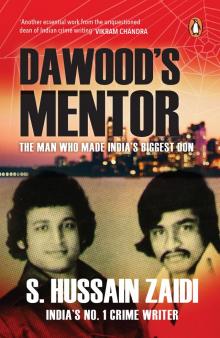 Dawood's Mentor
Dawood's Mentor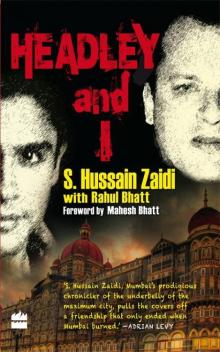 HEADLEY AND I
HEADLEY AND I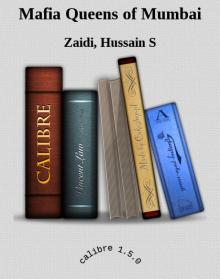 Mafia Queens of Mumbai
Mafia Queens of Mumbai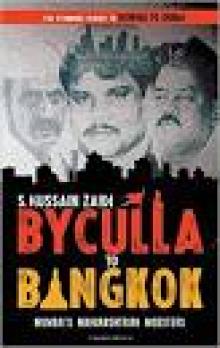 Byculla to Bangkok
Byculla to Bangkok Black Friday
Black Friday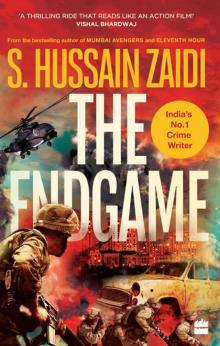 The Endgame
The Endgame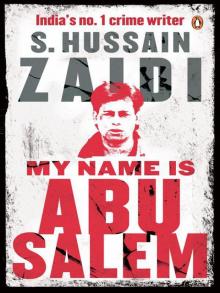 My Name is Abu Salem
My Name is Abu Salem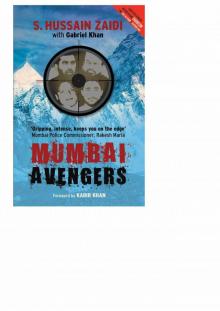 Mumbai Avengers
Mumbai Avengers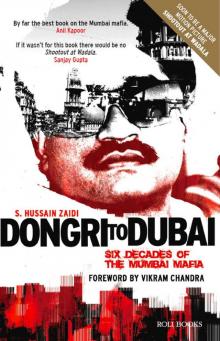 Dongri to Dubai - Six Decades of the Mumbai Mafia
Dongri to Dubai - Six Decades of the Mumbai Mafia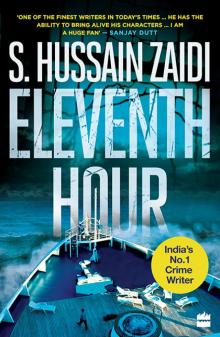 Eleventh Hour
Eleventh Hour